In Case of Plumber SEO: Why Your Best Tool Isn't in Your Truck—It's on Google
Imagine this: a homeowner in your service area has a burst pipe flooding their kitchen. They don’t grab the Yellow Pages. They grab their smartphone and search for “emergency plumber near me.” In that critical moment, will they find you, or your competitor?
This guide is your complete blueprint. We’ve distilled the complex world of SEO into a clear, step-by-step framework designed specifically for plumbing businesses. Follow these steps, and you won’t just be online; you’ll be dominating your local market.
That moment is the new frontline of marketing for plumbing companies. Search Engine Optimization (SEO) isn’t a vague technical buzzword; it’s the single most powerful system for ensuring your business is the one that gets the call. While your competitors are burning cash on inconsistent ads, a robust SEO strategy works for you 24/7, building a sustainable pipeline of high-intent, local customers who are actively searching for your exact services.
1. The Digital Storefront: Master Your Google Business Profile
Before visitors land on your website, their first introduction to your business is often through Google. Your Google Business Profile (GBP) serves as your most vital SEO asset, functioning as your digital storefront, billboard, and business card simultaneously. It plays a crucial role by showing up in the vital “Local Pack” map results. Ignoring it is akin to having a shop without a sign on the door, missing out on potential customers the moment they search.
- Claim and Verify: Visit [google.com/business] and ensure you obtain your listing, as this step is absolutely essential. If the listing is already present under another account or ownership, initiate a request to transfer ownership to you. The verification process will require Google to send a postcard containing a Personal Identification Number (PIN) directly to the physical address associated with your business. This step is crucial to validate that your business operates locally and is recognized as an authentic entity within your community.
- Perfect Your NAP: Make sure your Name, Address, and Phone Number (NAP) are consistently the same on your GBP, website, and all online directories. Even a minor error in your phone number or a slight difference in your business name can confuse Google and negatively impact your rankings.
- Choose the Right Categories: Choose “Plumber” as your main category to accurately represent your core business in local searches. Afterward, expand on this by including secondary categories that highlight your specific services. For example, if you specialize in more niche areas, add categories like “Drain cleaning service,” “Water heater installation,” or “Gasfitter” to ensure these services are visible and accessible to potential customers searching for specialized plumbing solutions.
- Pack it with Information: Complete every section meticulously. Include your service areas, detail your hours of operation—don’t forget to mention 24/7 emergency services if available. Provide a link to your website and include a link for appointment bookings.
- Utilize GBP Features:
- Photos & Videos: Frequently share top-notch images showcasing your team, your company-branded vehicles, and instances of successfully completed projects (ensure you have permission from customers). Additionally, include photos of your staff actively engaged in their work. Doing so significantly enhances trust and credibility with potential and existing clients.
- Google Posts: Post updates, exclusive offers, or new blog articles straight to your Google Business Profile. These serve as mini-advertisements that prominently display within your business listing.
- Q&A Section: Take the initiative to fill out this section by providing answers to frequently asked questions directly. For instance, “Do you offer free estimates?” or “What are your emergency service hours?” By doing so, you address potential customer inquiries in advance and highlight your expertise in the process.
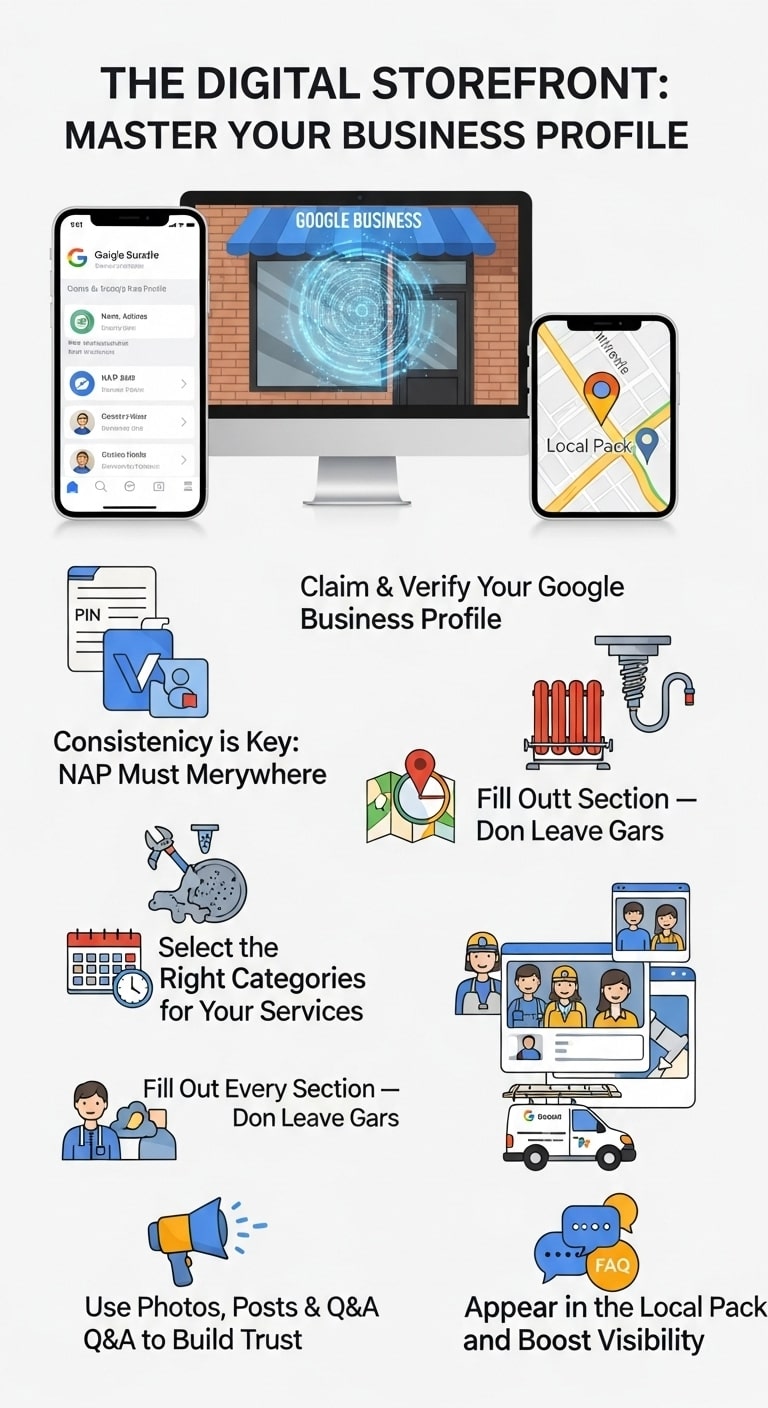
2. Your Website: The 24/7 Sales and Conversion Hub
If your Google Business Profile serves as the storefront, then your website functions as the showroom. It’s the place where you effectively transform an interested searcher into a paying customer. To achieve this, your website needs to be fast, user-friendly (especially on mobile devices), and optimized for search engines to ensure it ranks well.
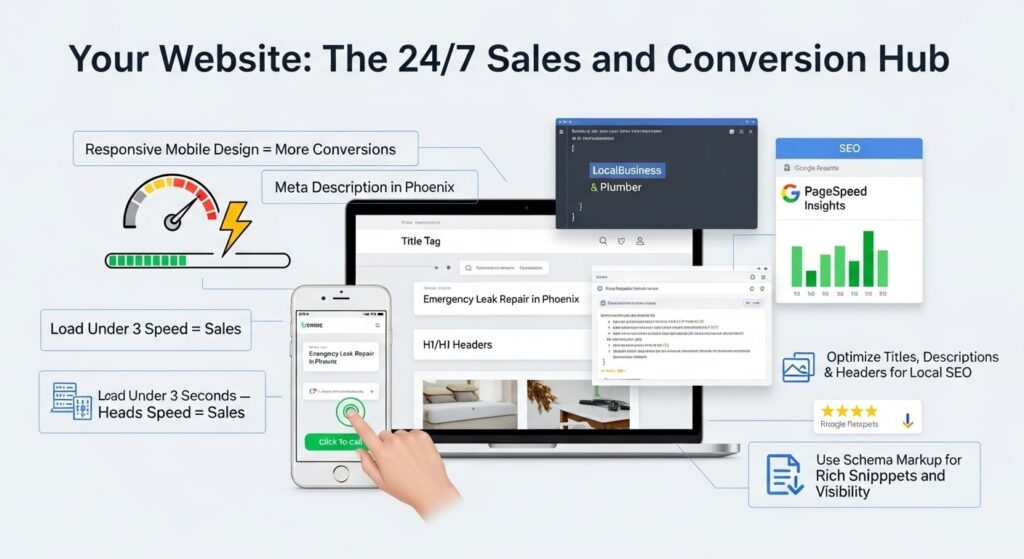
- Mobile-First is a Must: More than 70% of all local searches are conducted on mobile devices, frequently in the midst of a plumbing emergency. Therefore, it’s crucial that your website is flawlessly responsive. This means it should appear and function seamlessly on a smartphone. Ensure that the text is legible and easy to read, and that your phone number is formatted as a “click-to-call” link for immediate access.
- Blazing-Fast Speed: A website that takes longer than three seconds to fully load will likely result in the loss of potential customers, as people tend to leave in search of faster options. To ensure your site is up to speed, utilize the PageSpeed Insights tool provided by Google. This tool evaluates your site’s loading time and offers specific recommendations for improvement. Two critical components to consider are compressing your images to reduce file size without sacrificing quality, and opting for a high-quality hosting service to boost overall performance and reliability.
- On-Page SEO Fundamentals: Ensure that every page on your website is finely tuned to clearly communicate its purpose and content specifics to Google.
- Title Tags: This is the clickable blue link that shows up in Google search results. It should incorporate both your primary service and the location you operate in to maximize visibility. For instance, you might say, “Emergency Leak Repair in Phoenix | [Your Company Name].”
- Meta Descriptions: The brief description under the title tag is essential, as it may not influence search engine rankings directly, but it dramatically boosts click-through rates if crafted well. For instance, consider a snippet like “Offering 24/7 emergency leak detection and repair services throughout Phoenix. Our team of licensed and insured plumbers is ready to serve you. Reach out now for a quick and efficient response!”
- Header Tags (H1, H2, H3): Each page should contain one H1 tag to define the primary subject clearly (such as “Water Heater Installation & Replacement”). This helps indicate to search engines the main focus of the page. To provide a coherent and organized structure for the rest of the content, utilize H2 and H3 tags. These subheadings break down the information into manageable sections, enhancing readability and ensuring the content flows logically.
- Schema Markup (The “Translator for Google”): Schema markup is a specific type of code added to your website’s HTML that allows search engines to better comprehend the details and context of your site’s content. This is particularly significant for plumbing companies, as implementing the appropriate schemas, such as “LocalBusiness” and “Plumber,” becomes crucial. These schemas communicate important business information to Google, including your physical address, contact phone number, business hours, and customer reviews. When applied effectively, schema markup can enable your website to earn “rich snippets,” such as eye-catching star ratings or other enhanced information in search engine results pages. This additional information helps your business stand out prominently from competitors, potentially attracting more visitors to your site.
3. Keyword Research: Speaking Your Customer's Language
To increase your online visibility, it’s crucial to understand the specific terms and phrases your potential customers are entering into Google search. Keyword research involves uncovering these valuable search terms that reflect the needs and concerns of your audience. This means putting yourself in the shoes of a customer facing a plumbing issue.
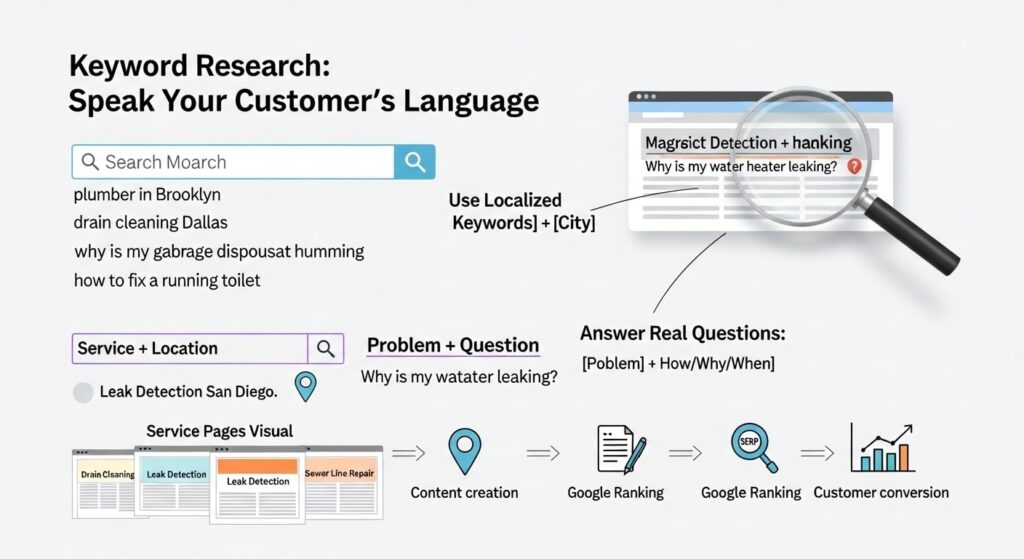
- These are the phrases potential customers search when they urgently require services, making them your highest priority. The typical formula to follow includes combining [Service] with [City/Neighborhood]. For example, this can include search terms like “plumber in Brooklyn,” “drain cleaning Dallas,” “water heater replacement San Diego,” and “emergency plumber near me.”
- These are the types of questions potential customers typically search for when they’re in the process of making a buying decision. By developing content based on these keywords, you can position yourself as the go-to expert in your field. The formula to consider here is combining a [Problem] with a [Question]. For example, common queries include: “why is my garbage disposal humming,” “how to fix a running toilet,” and “signs I need a new water heater.”
- Create Dedicated Service Pages: Avoid placing all your services on a single page. Instead, develop a distinct and comprehensive page for each primary service you offer, such as Drain Cleaning, Leak Detection, and Sewer Line Repair. By doing this, you can optimize each page for its specific high-value keywords, which demonstrates in-depth expertise to both your users and search engines like Google.
4. Content Marketing: Proving Your Expertise and Building Trust
Your website should include more than just service pages; it should have a robust blog as well. A blog serves as one of your most potent tools for targeting “problem” keywords and establishing your authority in the industry. By consistently providing high-quality blog posts that address common issues and concerns, you increase your chances of being found by potential customers. When visitors land on your site and find solutions to their plumbing problems through your content, you become the trusted expert they rely on. This trust makes you the first person they’ll reach out to when they need professional plumbing services.
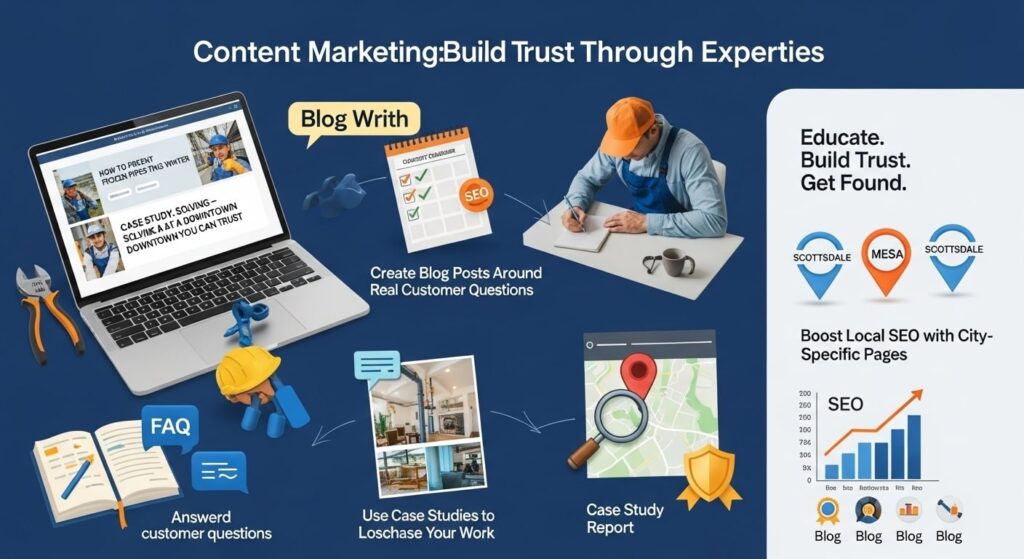
- Answer Common Customer Questions: Develop blog posts that respond to the common questions and concerns customers frequently express. For example, topics might include “5 Effective Strategies to Prevent Pipes from Freezing During Winter,” “Comprehensive Guide: What to Expect from a Plumbing Inspection,” or “Comparing Water Heaters: Tank vs. Tankless – Which Option Suits Your Needs Best?”
- Showcase Your Work with Case Studies: Summarize a recent project in detail. For example, consider a “Case Study: How We Solved a Hidden Leak for a Downtown Restaurant.” This kind of detailed account serves as social proof and effectively showcases your skills and expertise.
- Create Location-Specific Pages: If your plumbing business operates in several towns or unique neighborhoods, it’s essential to create individual pages tailored for each location. For instance, having a dedicated page titled “Plumber in Scottsdale” and another specific to “Plumber in Mesa” will improve your search rankings in those particular areas more effectively than a single, broad “Phoenix Area” page. This targeted approach ensures that your services are easily found by potential customers in each distinct community you serve.
5. Off-Page SEO: Building Authority with Digital "Votes of Confidence"
The perception of your website by others significantly impacts its credibility. Off-page SEO revolves around acquiring “votes of confidence” through backlinks—links from other reputable websites directing traffic to your own. When these credible sites link to your content, it signals to Google that your plumbing business is a trustworthy, authoritative player within the industry. A robust backlink profile essentially serves as a testament to your legitimacy and reliability, enhancing your standing in search engine rankings.
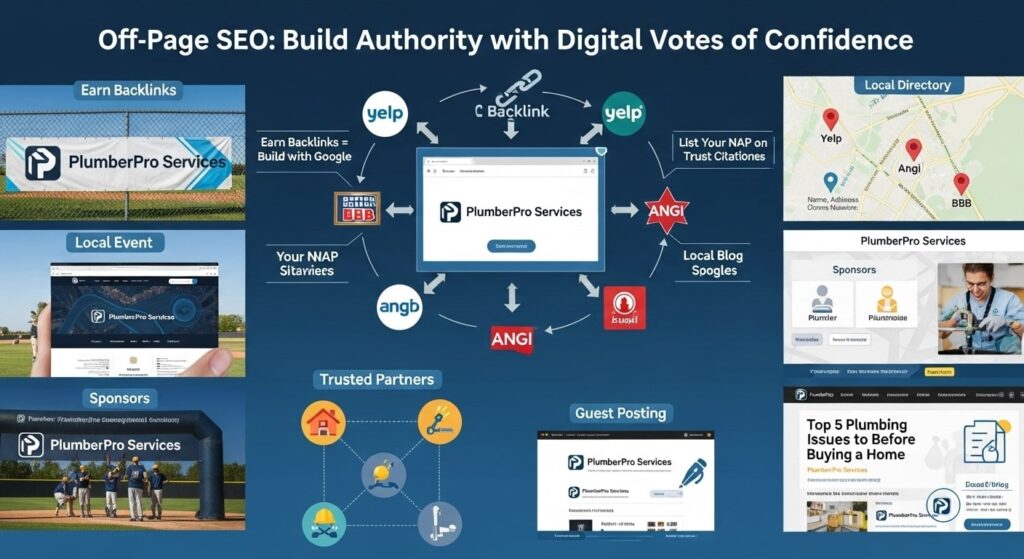
- Local Directories and Citations: In addition to optimizing your Google Business Profile, it’s crucial to ensure that your business is consistently listed with the same name, address, and phone number (NAP) on other reputable directories. These directories include well-known platforms such as Yelp, Angi, and the Better Business Bureau, which help reinforce the authenticity and credibility of your business.
- Sponsor a Local Charity or Event: Supporting local initiatives, like sponsoring a little league team, participating in a community 5k, or backing a charity event, frequently leads to your website being linked on their sponsors’ page. These backlinks from local organizations are extremely valuable for SEO.
- Partner with Other Local Businesses:Forge partnerships with complementary home service businesses such as roofers, electricians, or restoration experts. By collaborating with these non-competing professionals, you can mutually recommend each other’s services to your respective customer bases. Additionally, consider creating a network of “trusted partners” by linking to each other’s websites. This strategy not only enhances your credibility but also increases referral opportunities and strengthens your off-page SEO efforts.
- Guest Posting:Craft an informative article tailored for a local real estate blog or a home improvement website on a relevant topic such as “Top 5 Plumbing Issues to Inspect Before Purchasing a Home.” This collaboration offers mutual benefits, as you’ll be able to include an author bio that features a direct link back to your own website, driving potential clients and enhancing your online presence.
6. The Ultimate Trust Signal: Generating and Managing Customer Reviews
For businesses that provide local services, online reviews serve as the currency of trustworthiness and credibility. Consistently receiving positive reviews is among the most influential ranking factors for securing a prominent spot in the Google Local Pack.
- Make It a Process: Don’t just hope for reviews; build a system to get them.
- Ask at the Right Time: The most opportune moment to request feedback from a customer is right after completing a job successfully, while the customer is still feeling satisfied and pleased with the service received.
- Make It Easy: Send a follow-up email or a text message to your customers, including a direct link to your “Leave a Review” page on Google. Make the process as simple as possible by providing them with immediate access, so they won’t need to spend extra time searching for where to leave their feedback.
- Respond to Every Review: Thank customers for positive reviews. For negative reviews, respond professionally and politely. Acknowledge their issue, take the conversation offline to resolve it, and show potential customers that you care about customer service. A well-handled negative review can be more powerful than a dozen positive ones.
7. Tracking and Measurement: Know What's Working
SEO requires ongoing attention and effort; it is not something you can simply implement once and leave unattended. To guarantee that your investment in SEO is delivering the desired outcomes, it is essential to consistently monitor and analyze your results.
- Set Up Google Analytics: This complimentary tool provides insights into the number of visitors to your site, detailing which specific pages they are viewing and how they arrived at your website. It sheds light on the various channels directing traffic to you, such as organic searches through Google, direct visits, and other sources.
- Use Google Search Console: Another no-cost resource that reveals the specific keywords for which your website is ranking, identifies any technical issues detected by Google, and provides information on the number of clicks your site is receiving from search results.
- Track Your Key Performance Indicators (KPIs): Don’t get lost in data. Focus on what matters:
- Organic Traffic: Has there been an increase in the number of people visiting your website from search engines this month compared to the previous month?
- Keyword Rankings: Have you noticed an improvement in your positioning within search engine results for your primary revenue-generating keywords?
- Phone Calls & Form Submissions: The most critical measure of success in your SEO efforts is the increase in qualified leads generated by your website. Are you noticing a boost in potential customers reaching out to you? To ensure clarity on this, employ call tracking software, which helps identify which inquiries are specifically a result of your SEO strategies.
8. Adapting and Evolving: The SEO Long Game
Search Engine Optimization (SEO) is more accurately described as a marathon rather than a sprint. It requires endurance and sustained effort over time. Your competitors are constantly making efforts to improve their own SEO strategies, and Google’s search algorithm is frequently updated and refined. For these reasons, it is crucial to commit to a perpetual cycle of analyzing and enhancing your SEO tactics. Remaining proactive and adaptable in your approach will help ensure that your website maintains its competitive edge in the search engine results pages.
- Conduct Regular Audits: At least once every six to twelve months, it’s essential to conduct a thorough SEO audit. During this process, assess how well your targeted keywords are performing to ensure they remain effective. Additionally, evaluate the technical aspects of your website to check for any issues that could impact its functionality or search engine rankings. Take the time to study your competitors’ strategies and performance, as this can provide valuable insights and areas for your own improvement. Finally, look for fresh opportunities to create engaging content and acquire high-quality backlinks to strengthen your SEO efforts.
- Stay Informed: Stay updated on the latest trends in SEO to maintain a competitive edge. For instance, the increasing popularity of voice search technology (“Hey Google, find a plumber near me”) suggests that conversational and question-based keywords are gaining significance. As more people use voice assistants, it becomes critical to integrate these natural, spoken phrases into your SEO strategy to capture the growing audience leveraging this technology.
- Double Down on What Works: Leverage your website analytics to identify which of your blog articles or service pages are attracting the highest amount of traffic and generating the most leads. Once you have this insight, produce additional content in a similar vein to capitalize on what is resonating strongly with your audience.
9. Your SEO Success Checklist and Final Thoughts
Implementing an effective SEO strategy for your plumbing business might initially seem daunting. However, the process essentially revolves around maintaining a consistent effort in key areas. By focusing on these crucial pillars of SEO—such as optimizing your website, employing targeted keywords, and creating valuable content—you can significantly enhance your online visibility. Don’t wait any longer; begin transforming your plumbing business with these SEO techniques today.
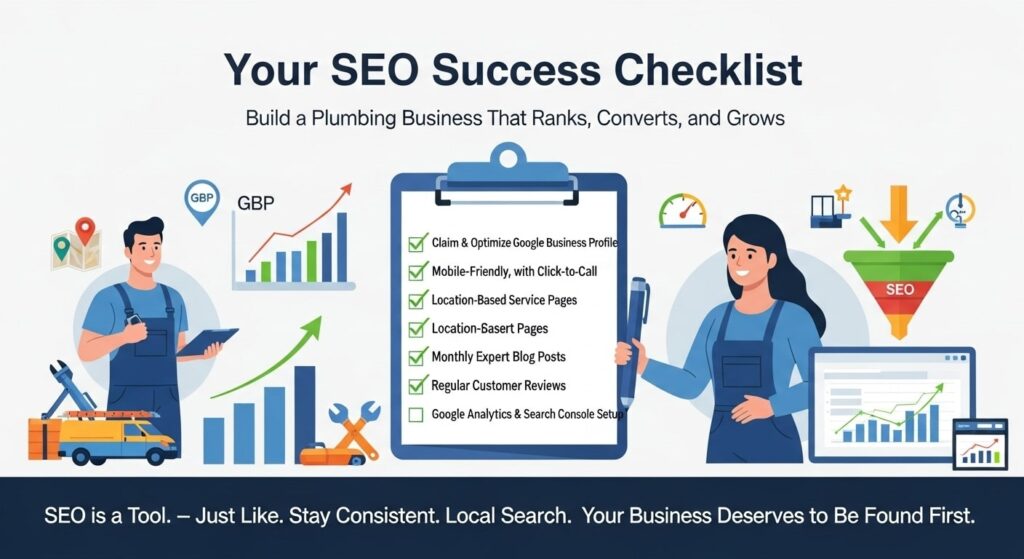
- Claim and fully optimize your Google Business Profile. (Do this today)
- Ensure your website is fast, mobile-friendly, and has click-to-call numbers.
- Build out dedicated pages for each of your core services, optimized with location-based keywords.
- Start a blog and commit to publishing one helpful, expert article per month.
- Create a system to consistently request and manage customer reviews.
- Set up Google Analytics and Search Console to track your progress.
By considering SEO as a foundational element of your plumbing business, akin to the importance of your tools, vehicles, and skilled team, you nurture a robust, lasting asset for your company. This strategic focus on SEO practices creates a consistent stream of inbound leads, propelling your growth, and positioning your business as the top expert in your locale. This ensures that whenever a prospective customer faces an urgent plumbing issue, it is your phone that rings first, ready to provide the solution they need.
Frequently Asked Questions (FAQ) about Plumber SEO
Q: How do I market my plumbing company?
A: The most successful marketing strategy involves integrating several key elements. Firstly, establish a robust SEO foundation, as detailed in the prior sections, to ensure you’re effectively capturing organic search demand. Additionally, make sure you have a fully optimized Google Business Profile, which is crucial for enhancing your local visibility. Furthermore, consider incorporating Pay-Per-Click (PPC) advertising, such as Google Local Services Ads, to secure immediate and prominent top-of-page placement. This combination of SEO, local optimization, and targeted advertising ensures your plumbing business is positioned to attract and convert potential customers effectively.
Q: How do I get my plumbing company on Google?
A: The initial and most crucial action is to create or claim your Google Business Profile. This ensures your plumbing business is listed on Google Maps and appears in local search results, thereby increasing your visibility to potential customers. Next, it’s essential to develop a robust website for your company and apply effective SEO strategies. Implementing these SEO principles will help your site rank higher in the traditional organic search results, attracting more traffic and potentially increasing your customer base.
Q: Can I do SEO for my plumbing business myself?
A: Certainly! Adhering to the strategies outlined in this guide will help you cover the foundational aspects of SEO. Basic tasks such as optimizing on-page elements, managing your Google Business Profile, and developing quality content are manageable for most business owners. However, as you delve into more complex technical elements and pursue competitive link building, you may find it beneficial to enlist the expertise of a freelance specialist or partner with an experienced agency.
Q: Why is Local SEO so important for plumbers?
A: Since plumbing is a service that heavily relies on local demand and often addresses urgent needs, it is not practical for someone to seek a plumber located 500 miles away. Local SEO specifically targets your business to appear in search results for queries such as “plumber near me” or “plumber in [Your City].” These searches are conducted by potential customers within your immediate service area who require your plumbing services promptly.
